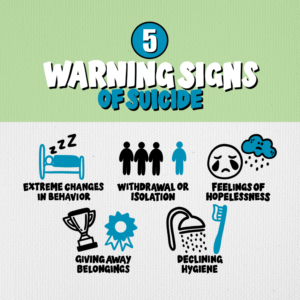 Suicide is a hard topic to talk about, but one way to make the topic feel more approachable is to become educated on it. From the causes of suicide, to why people choose to attempt, to the risk factors of suicide, there are many aspects of suicide that we can learn about. When it comes to preventing suicide, one helpful way to do so is to become familiar with the warning signs. Below, we’ve listed FIVE warning signs that might mean someone might be in danger. Not all of these signs are present in individuals considering suicide, meaning that we cannot jump to conclusions if we see these signs. However, having awareness of these things can help us approach the topic with more knowledge and comprehension.
Suicide is a hard topic to talk about, but one way to make the topic feel more approachable is to become educated on it. From the causes of suicide, to why people choose to attempt, to the risk factors of suicide, there are many aspects of suicide that we can learn about. When it comes to preventing suicide, one helpful way to do so is to become familiar with the warning signs. Below, we’ve listed FIVE warning signs that might mean someone might be in danger. Not all of these signs are present in individuals considering suicide, meaning that we cannot jump to conclusions if we see these signs. However, having awareness of these things can help us approach the topic with more knowledge and comprehension.
- Talking about feeling hopeless or having no purpose: When we hear people talking with this verbiage, sometimes it’s hard to discern whether it’s just a bad day that’s causing these thoughts or if there’s something serious going on. Pay attention to the frequency with which they are saying these comments. If it becomes repeated and patterned in your conversations, it might be time to reach out and address it.
- Withdrawing or isolating: Untreated depression is a leading cause of suicide. Clinical Depression is a mental health disorder characterized by persistent depressed moods or loss of interest in life, and it is often made worse when individuals isolate themselves. Isolation prevents these people from human interaction, which then prevents them from getting the help they need.
- Declining hygiene: Taking care of our bodies is one way that we show kindness to ourselves. When we stop taking care of ourselves, this can be a sign that we’ve lost interest in life and have thoughts of giving up entirely. If you noticed someone with persistent body odor, unbrushed hair, or just an overall lack of hygiene, this might be a sign that their mental health is declining.
- Giving away belongings: This is a sign of suicide in individuals that have actively made the decision that they are going to attempt. For these individuals, giving away their possessions is a way to prepare for their suicide.
- Extreme changes in behavior: This can include changes in mood, appetite, activity levels, and sleep patterns. Do they seem extra anxious or hopeless? Is their appetite noticeably smaller or larger? Are they engaging in less physical activity than normal? Are they sleeping more or less than usual?
It may seem daunting to pay attention to all of these things, but just remember that at the end of the day, we are not responsible for saving everyone and preventing all the suicides in the world. But as responsible individuals, being aware of these signs is crucial in being aware and educated. We never know what other people are going through behind closed doors, but we CAN be intentional about caring for our communities enough to notice these red flags and bring awareness to them.
Suicide Hotline: 1.800.273.8255
By Lexi Breunig

